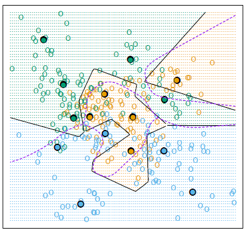Courses

ANALYTICS I: STATISTICAL LEARNING
A first-course on the theory and applications of statistical signal processing. Topic will benefit students interested in the design and analysis of signal processing systems. The course provides numerous examples, which illustrate both theory and applications for problems such as high-resolution spectral analysis, system identification, digital filter design, adaptive beamforming and noise cancellation, and tracking and localization. Prerequisite is a background in probability and random processes and linear and matrix algebra and exposure to basic signal processing.

IMAGING AND DEEP LEARNING
This course is an introduction to Imaging Systems and Deep Learning. Sensor devices capturing energy across the electromagnetic spectrum provide a rich gamut of images that can be processed digitally for a myriad of applications including medical, surveillance, remote sensing, and consumer electronics. This course provides the fundamentals mathematical tools for image analysis covering topics in sampling, perception, color, Fourier analysis and representation, unitary transforms, noise reduction and restoration, computer tomography, compression, and machine learning for classification and computer vision.